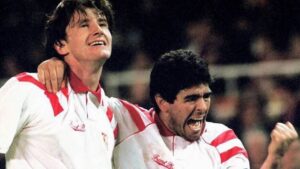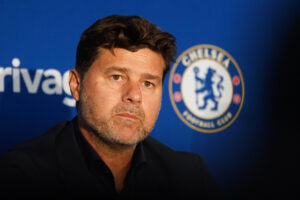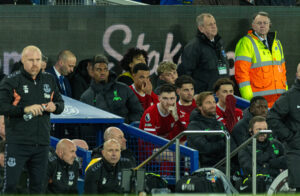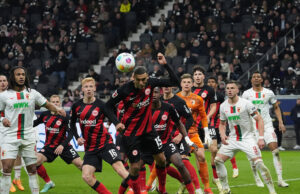Famous Five: Harry Kane’s 95th minute winner against Slovenia may have confirmed England’s qualification for next summer’s World Cup, but it still does not rank among the greatest late goals in English football history.
England’s World Cup qualifier against Slovenia was quite an appalling match, but a dramatic late goal redeemed it. For all the instinctive brilliance of Harry Kane’s stoppage-time winner, however, it still does not rank among the greatest late goals in the long history of English football.
Five Late Goals in English Football History
David Platt vs Belgium, 1990 World Cup
It is often said that the hardest technical skill to master in football is the ability to hit the ball coming over your shoulder. How much harder, then, it must be to master that hardest of skills in the last minute of a World Cup knockout match? But that is precisely what David Platt did for England against Belgium at the World Cup in Italy in 1990.
When Platt scored his wonder goal, the game was not just in the last minute of normal time but the last minute of extra time. All of England and all of his team-mates were convinced that penalties were inevitable; manager Bobby Robson was probably drawing up his five first-choice penalty-takers. However, that was when Platt made penalties utterly irrelevant.
For Platt himself, for the England team he played in and indeed for English football as a whole, that goal was transformative, or to use the term that is more commonly used now, a “game-changer”. Platt had been a goal-scoring star of the Aston Villa side that finished runners-up to Liverpool in the 1989-90 domestic season but, as he himself happily admitted afterwards, his stunning goal against Belgium catapulted him on to the global stage. Ultimately, it earned him the big moves to and within Italy that, for a brief period in the mid-1990s, made him the most expensive footballer in the world up to that point (calculated in terms of overall, cumulative transfer fees).
For the England side that Platt played in, his late winner seemed to release much of the tension and anxiety that had typically gripped them in the group stage and they swept magnificently to the semi-final. And for English football as a whole, Platt’s “over-the-shoulder” number led to a whole series of other, much larger and more important numbers, as the anger and angst of the Eighties was forgotten and the idea for the Premier League was first planted. The rest, as they say, truly was historic.
Ole Gunnar Solksjaer, 1999 Champions League Final
It is unarguable that Sir Alex Ferguson is domestically the greatest manager in British football history; his astonishing 13 Premier League titles with Manchester United, not to mention the three Scottish Premier League titles with Aberdeen, make any counter-argument redundant. His European record, on the other hand was relatively patchy, at least compared with the dominance he enjoyed both in England and in Scotland. For a long time, he failed to make a significant impression in the European Cup/Champions League, and had to wait a long time to reach the pinnacle of European football and ultimately he had to thank Ole Gunnar Solskjær for taking him there.
Manchester United’s treble-winning season of 1999 has justifiably earned both historical and mythical status, as United became the first English team to win the League, the FA Cup and the European Cup/Champions League in the same season. To a large extent, United’s treble was achieved on the back of late goals, going right back to their FA Cup fourth-round clash with Liverpool, when they scored not one but two late goals to overturn Liverpool’s early lead. And that pattern was repeated in Barcelona some four months later, when they again came from a goal down late on to achieve a remarkable, indeed seemingly impossible, victory.
As every United fan knows, they laboured for much of the 1999 Champions League final against Bayern Munich. Both Roy Keane and Paul Scholes were banned for the final, allowing the impressive Bayern midfield of Effenberg, Basler and Jeremies, supported by Lothar Matthäus as a sweeper, to dominate proceedings. But at the end, after Bayern had failed to kill the game off, two archetypal English corner-kicks led to, first, an equaliser by Teddy Sheringham in the 91st minute and then, incredibly, to Solskjær’s 93rd-minute winner.
Sergio Agüero vs QPR, 2012
Sergio Agüero provided Manchester City fans with their own unforgettable “Solskjær”-type moment in 2012, when his 95th minute winner against Queens Park Rangers won City their first ever Premier League title and only their third English league title in total. It marked the moment when the great City mega-moneyball experiment finally delivered.
Rather like Manchester United in 1999, City’s Premier League triumph in 2012 came down to the final game of the season, against a QPR side who were still battling relegation as the game began. Unlike United in 1999, City largely dominated the early part of the game, deservedly going ahead just before half-time through Pablo Zabaleta. In the second half, however, they seemed to revert to the City of the last four decades, by allowing QPR not only to equalise but to take the lead, a lead they kept until the game entered stoppage time.
With United winning at Sunderland, defeat it might have endangered the whole Abu Dhabi investment in the club. Fortunately for City, they got their two late goals, first through Edin Dzeko and then, majestically, through Agüero. And yet, for all the resilience and brilliance of City’s comeback, it is questionable whether it would have been achieved at all if QPR had not learned late on that their relegation rivals, Bolton, had already lost their game and gone down. As a result, they switched off mentally, at least a little, allowing City to win the league and finally escape the enormous shadow of United.
Michael Thomas vs Liverpool, 1989
In 2012, Manchester City were at home against a team facing relegation, but in 1989 Arsenal were not just away but away against the reigning champions, Liverpool, who were going for a league and cup double. For that reason alone, Michael Thomas’s effort wins the battle of the last-minute title-winning goals.
Of course, the game against Liverpool was not supposed to be Arsenal’s final game of the season, but the Hillsborough disaster in April 1989 had necessitated the complete redrawing of the season’s closing fixtures. Consequently, after winning the FA Cup at Wembley against city rivals Everton, Liverpool ran out against Arsenal at Anfield needing only a draw, or even a narrow one-goal defeat, to secure the title and the double.
Perhaps Liverpool were ultimately overcome by all the emotion and heartache of recent weeks; perhaps Arsenal felt that they had already blown the title after failing to win either of their two previous league games and so played their final match with relative freedom. Whatever the reason, unlike City in their fortuitous victory over QPR in 2012, Arsenal dominated the game, with George Graham’s selection of three centre-backs providing the defensive solidity that allowed the team’s attacking players to flourish.
And flourish they did, with Alan Smith scoring the first goal just after half-time and Michael Thomas scoring the latest of late winners with virtually the last kick of the match. As a result, Liverpool’s golden age was nearly over, and Arsenal’s own modern golden age – first under Graham and then under Arsène Wenger – had begun.
Jimmy Glass vs Plymouth, 1999
It may seem counter-intuitive to choose Jimmy Glass’s last-minute winner for Carlisle on 8th May 1999 ahead of Solskjær’s treble-winner just a few weeks later as the greatest late goal ever scored in English football history, but there are compelling reasons for making such a claim. First, Glass’ goal for Carlisle secured the club their league status, as without it they would have been relegated from the Football League and their long-term future would have been thrown into doubt. Secondly, and even more compellingly, Solskjær was a striker whereas Glass was a goalkeeper, and thus more used to saving goals than scoring them.
Glass was not even a full-time Carlisle player when he saved the club from possible extinction. He was actually on loan from Swindon when he achieved footballing immortality of his own by scoring the one and only goal of his long and otherwise fairly undistinguished career. The game was very nearly up for Carlisle when, with just 10 seconds of normal time left, he sprinted upfield for a corner and, finding himself unmarked in the penalty area, smashed home a winner.
It was unarguably the highlight of Glass’s career, the vast majority of which was spent in the lower divisions of the league and even non-league. But at that moment, when he became the on-loan goalkeeper who scored the last-second winner to preserve his loan club’s league status, he momentarily became every cult hero combined.
Main Photo
Embed from Getty Images






